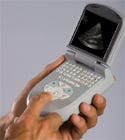May 6, 2011
|
The Acuson P10 is the world's first pocket ultrasound. |
Back in March, the Wall Street Journal published an article on how mobile devices help improve treatment in which a San Diego-based cardiologist trumpets his decision to forsake his stethoscope in favor of GE's Vscan handheld portable ultrasound unit. "Why would I listen to 'lub dub' when I can see everything?" the cardiologist, Eric Topol, said to the paper. This brief comment has since sparked some fascinating debate as to whether the days of the stethoscope are numbered and what role handheld imaging systems may play in the future of healthcare.
An expected and ubiquitous sight resting atop the white coat, stethoscopes are often used as symbols to represent the physician profession. So, it's strange to to think of a world without them. However, the WSJ article has people positing that handheld ultrasound systems like the Vscan and Siemens' MDEA award-winning Acuson P10 will soon supplant the use of the stethoscope, for the most part. Notably, an interesting article and subsequent debate in the comments section of a piece on iMedicalApps argues this point. Further supporting this prediction is an intriguing editorial that appeared today on the blog MedGadget.
Supporters of this handheld ultrasound-dominated view of healthcare's future make some valid points that are difficult to refute. After all, the ability to use ultrasound at the point of care could truly enhance patient care and outcomes by expediting diagnoses and, consequently, treatment.
On the other side of the coin, some people have weighed in that handheld systems will likely be used in conjunction with stethoscopes, complementing the stethoscope rather than simply replacing it. Stethoscopes still have their use, according to supporters, and costs will prohibit the exclusive use of handheld systems.
Dan Buckland of MedGadget thinks otherwise, however. "The price of an ultrasound system doesn't have to compete with a stethoscope because it can tell you much more with similar training. As an example, I'm pretty sure you could train a medical or nursing student how to identify and quantify mitral regurgitation with ultrasound in the same time it took you to teach them to auscultate it (which then has to be followed up with a transthoracic or TEE echo anyway). Auscultation with a stethoscope might be second nature to established MDs, but it still took experience and training to get to that point. I think we could make a reasonable assumption that the 'science' of auscultation is mature. On the other hand, with advances in materials science, image analysis, machine vision, and all the tech which makes a smartphone more powerful and capable than the computers on the Apollo spacecraft, ultrasound still has a way to go and will end up much easier to use to get much higher diagnostic reliability."
As for me, I'm not a doctor, so I can't make a completely informed decision. But I do suspect that the stethoscope may someday relatively soon be obsolete. I don't, however, believe that the current generations of the Vscan and P10, for example, will be the technologies that do it. Costs will need to come down dramatically for these systems to be an essential and omnipresent part of the physician's tool kit. Furthermore, the design of these mobile ultrasound systems will need to be even more intuitive and essentially foolproof. Lastly, battery life will need to be extended to support the more regular use, although this area is promising thanks to the wealth of enhanced power solutions currently in development.
With these seminal products and the ever-advancing smartphone and iPad/tablet technologies, it's likely that handheld ultrasound technologies in some form or another will quickly evolve into an essential part of healthcare. The question is just how fast we'll get to that point.
Where do you stand? Are you team stethoscope or team portable ultrasound? Let us know your thoughts in the comments section. Plus, learn more about advances in ultrasound design and portability in our upcoming virtual event, "Equipment Design for an Evolving Marketplace." Head over to the site for more information on the conference sessions and to register for the free event.--Shana Leonard
You May Also Like



